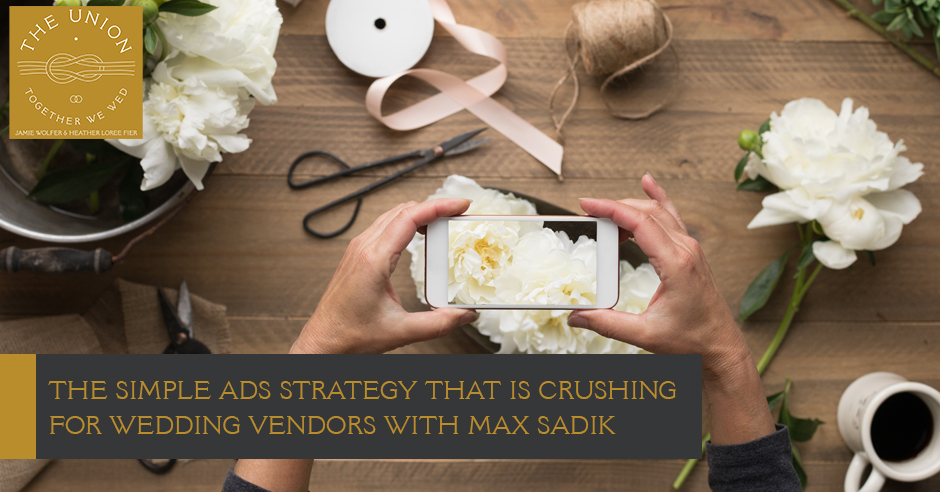
The age-old question for wedding vendors is how do you get your name out there and make sure you reach the right people? In the age of social media, some might argue marketing for wedding vendors has become a lot easier and doesn’t require the capital that it might have in the past. Max Sadik, wedding photographer extraordinaire, chats with Jamie Wolfer and Heather Loree Fier about how wedding vendors can make the most bang for their buck when it comes to marketing. At the end of the day, marketing really is a game of being smart about who you want to reach and what kind of content you want to provide for them. Learn from one of the most booked photographers in the industry, and see how you can avoid overpaying for advertising that you can essentially do for yourself.
—
Listen to the podcast here:
Important Links:
- Max Sadik
- Wedding Hackers
- Facebook group – Max Sadik’s Facebook Group
- WeddingWire
- The Knot
- YouTube – Jamie’s YouTube channel
- The Wedding Hacker
- https://www.MaxSadik.com/
- https://MarketingByMax.com/
About Max Sadik
 I was born in Ukraine back in the days of the communist Soviet Union, everything was a scarcity over there, nothing was plentiful.
I was born in Ukraine back in the days of the communist Soviet Union, everything was a scarcity over there, nothing was plentiful.
This encounter with poverty early on in life, set me on a path to do whatever it takes to make a LOT of money. I went on to earn a bachelor’s degree in Business Finance and a master degree in Business Administration with a minor in Marketing, opening my own construction company and making millions of dollars.
But… something was awfully wrong!
While if you looked on paper, my wife and I were living the “American Dream” in reality, we were both miserable. I literally worked 7 days a week and most days I was out by 6 am and not back until 8 pm… and then I would sit down to do some “emails” and work into the early hours of the morning. On our honeymoon, I spent as much time working as I did with my wife…
and that is a very sad fact because I will never be able to correct that mistake.
A few years later, my wife (who is an actress and a commercial model), purchased a used Rebel T2i that had like a gazillion shutter clicks on it, but somehow it still worked. She handed me the camera and asked that twice a week I take practice photos of her so that she can keep improving her craft. I ended up falling in love with photography, selling my construction company and becoming a wedding photographer.
It wasn’t long before I started falling into my old ways, and working 90-hour weeks. It was all hustle and nothing but hustle. But pretty quickly, my wife had a conversation with me and made it clear that this was not the life she imagined. She would rather have more of me than more money (I love my wife, she is amazing!!!).
I learned (after lots of research) that what was going to set me on the path of success was properly executed online advertising, specifically, Facebook ads. At first, I wasn’t any good, but after spending more than 10K on trial and error, more than 10K on curses, education, and workshops, and getting certified in ads by both Facebook, and Google something magical happened!
I started to have what felt like an unlimited flow of inquiries of exactly the type of couples I want to work with. Having confidence in the fact that I do not need to worry about inquiries, relieved a lot of pressure and helped me reduce my work schedule to a much more enjoyable level.
Now, I don’t have to jump out of bed at 6 am, I can enjoy a pleasant breakfast and a walk on the beach with my wife EVERY DAY (well, except Saturdays LOL).
The Simple Ads Strategy That Is Crushing For Wedding Vendors With Max Sadik
Book Up Your Calendar With This Simple Plan That’s Working For Thousands Of Wedding Vendors
Heather: I’m pumped because we have Max Sadik here who is an expert at marketing wedding businesses. For anyone in the wedding industry, read on. You’re going to want to absorb this completely and fully. He’s going to talk about why you as a wedding vendor need to sharpen your marketing skills. Why is it important for you to take control of your marketing? Why it’s important for couples to hire vendors who know how to handle their marketing. How to develop a business that has a never-ending flow of leads that you control and how building your business centered on serving you and your clients is going to make things exponentially explode, but also give you a lot of power.
—
Heather: I’m thrilled to have Max here. I have a real personal story with how we ended up connecting. He had the trademark on Wedding Hackers. For those of you who did not know, that is my business. I wrote a book and got 90% into writing the book. I saw that he had the trademark and about fainted and thought, “I’m going to reach out to this guy and hopefully he is a wonderful person and doesn’t tell me to change direction here.” I reached out to him and he heard about what I was doing and how we’re wanting to shake things up in this industry, help couples and vendors. He was like, “Heather, you can have this trademark. I will gift it to you.” He is a wonderful person as well as a genius at marketing. Thank you, Max, for being here. This is awesome.
Max: It’s my pleasure. I’m happy that you guys invited me to talk about it because there’s nothing I’m more passionate about than seeing small business owners being able to thrive while they’re helping the couple. It is what I wake up in the morning for.
Heather: I believe it and I have seen it in the way you interact. For those of you who are new to Max, he has a website MarketingByMax.com and he has a huge Facebook group that you want to be involved in. It has thousands of wedding vendors in it that are all working together to build better marketing for themselves and guiding each other. It’s super powerful stuff. Jamie, I know that you’re new to Max. What questions do you have for him?
Jamie: Max, first of all, I am excited you’re here for the most selfish of reasons. I’m going to be honest because I have barely even attempted to dip my toes into how to market online because it’s overwhelming and I don’t know what I’m doing. I have my pen and my paper ready and I’m going to grill you because I need everything that’s in your brain. I’m so excited about it. Thank you so much for being here to help me out, let’s be honest. Thank you so much.
Max: Let’s do this.
Jamie: If you can explain to me why it is important to take control of your marketing. What is the benefit of doing that? Why is that important?
Max: Number one, I wanted to define quickly what marketing is because the biggest misconception that exists, especially for small businesses is, marketing and advertising are the same things. While advertising is part of marketing, it’s a small part. Marketing is this overarching part of the arts and science of essentially dressing your business up. Marketing is as important for your business as the way you look when you leave your house. We don’t even think about it twice. We make sure we look in the mirror so we don’t look we’re a mess or have a piece of broccoli stuck between our teeth. We don’t do the same for our business. Marketing is doing that for the business. It’s making sure your business is presentable and is communicating itself properly through its appearance to the outside world.
Jamie: Let’s unpack that more.
Max: Think of it this way. When you first meet a person and it’s been scientifically proven that you draw conclusions about this person within the first few seconds. Clearly, nobody fools themselves thinking that you could look at a person and within a few seconds know anything about them. Nonetheless, you can’t help it yourself. You are automatically going to jump to conclusions because that’s how our mind works. We don’t spend the time thinking that the same happens for a business. When somebody encounters your business, within a few seconds, they’re going to draw conclusions. Those conclusions are going to be based on what they see since they don’t know anything else about your business.

Marketing For Wedding Vendors: When somebody encounters your business, within a few seconds, they will draw conclusions based only on what they see.
Heather: This is already good and deep, Max. Advertising is a small, tiny corner of this marketing. What do we need to know about advertising? Give it to us straight. What should people be doing?
Max: If we were talking 20 or 25 years ago, I would tell you that advertising is when you are carefully crafting your message to look all manicured and polished. However, that’s out the window. We’ve been shoved down our throats with advertising on TV, radio, newspapers and magazines for many years now that we, as a society, are almost allergic to it. You can see people have conditioned themselves to ignore advertising. What works now is when you take your organic message and you simply put money behind it. In my point of view, the best advertising that works the best is when you act in your paid advertising exactly as you are on your free channels. When you post on social media, it’s exactly how you should be advertising yourself. The more you can do that, which is hard because we have a mental block naturally, but the more you can do that, the more successful your advertising will be.
Heather: With all the psychology of advertising, there are a bajillion books, courses and there are all these things. For a wedding professional, where should they be looking? What advertising should they be doing? When you say acting naturally, are we talking about Instagram, Facebook, print magazines, probably not those, but what platforms?
Max: In my opinion, the best ROI is on social media. The reason for that is this, there are two ways to look at the demand. Your business is only going to be as profitable as there is a demand for its services. There are two types of demands. There are a push and a pull. When somebody goes on Google and they type in a wedding photographer, for example, they are demonstrating that they have demand for wedding photography. Google is going to come back with gazillions and bazillions of listings, and that’s called demand fulfillment. Google is going to attempt to fulfill their demand for a wedding photographer. It’s not about a bad thing to show up in Google, whether it’s paid or if your SEO rock star and you showed up right next to WeddingWire and all those big companies. Even if you showed up in an ad, that’s still good. However, the problem with this approach is at this time there are going to be tons of people competing for their attention. They have shown a clear signal that they’re looking for a wedding photographer.
When you look at the wedding journey overall, few couples wake up one morning and say, “Let’s get married this weekend.” It does happen, but that’s not a common occurrence. Usually, it’s a journey that takes about one year, 1.5 years, or maybe ten months, but it’s a relatively lengthy journey. Their demand for the service will start warming up slowly until it comes to this boiling point of which they sit down and start googling stuff. If you use social media, you’ll be able to do what’s called demand generation. In other words, if you can take your message and put it in front of that couple before they began googling and realize they need your services, you are creating a window time that allows you to warm them up to you.
If they googled ‘wedding photographer’ and you came up with one of those million other photographers or whether it’s florist or venue or whatever services that you provide. You don’t have the time to show them who you are. They’re going to look at all of those people in one or two settings. It’s going to be pretty quick. If you put your ad in front of them on social media two months earlier, you now have two months to slowly show them how good you are and show them your personality. When they do sit down to do that Google search, you’re going to be miles ahead of the competition.
Heather: I am reflecting on some of the amazing content that Jamie puts out on YouTube and think about that is where people are looking before they even are engaged to feel out what this wedding planning business is going to be. In that process, they get to know her and love her before they’re even putting a ring on someone’s finger. By that point, they’re already sold that they want to work with her. Is that what you’re mean?
Max: That’s exactly what I mean. What she’s doing there is one of the most genius ways of marketing. She’s essentially getting the couples to get to know her before they ever have the need for her services. When they do need the services, they may look at other competitors of hers. At that point, who are you going to go for? Somebody who you already know and trust or somebody who you’ve never heard of.
Jamie: That’s something that I’ve seen accidentally happen. I’ve talked about this on my channel. I’ve talked about it on other various social media platforms where I didn’t mean for it to be this to happen. I started it off as a means to help my current clients who potentially booked me for a day of coordination and they needed more hands-on help throughout the process. To be honest, I wanted a YouTube channel for years before I ever even started. Once I was like, “Two birds, one YouTube channel.” I’ve seen this explosion of people, whether they’re single, engaged or they’re other wedding planners looking for how to get into this and loving the content, which is overwhelming and humbling for me. I have a whole slew of people who call themselves Single Pringles that comment on my videos that I’m not even engaged and dating anybody but I’m watching this because I’m fascinated by the process. I’ve had people specifically comment, Max, on what you said, “I’m not engaged, but you can bet when I am calling you.” I didn’t know it was going to happen. It’s happening organically and it’s blowing my mind.
The biggest misconception that exists for small business is that marketing and advertising are the same thing. Click To TweetMax: You’re doing it the smart way. You’re warming them up through good content, but there’s a slew of psychological reasons why this is happening. Number one, you’re establishing yourself as an authority. They have time to see over time to watch your material and realize, “This person knows what she’s talking about. She’s not just calling herself a wedding planner or a coordinator but she’s demonstrated her knowledge.” There is respect towards people that we consider to be an authority. It’s like when we go to a doctor, when the doctor says, “Go do something.” You usually go and comply because you respect the authority of the doctor. There’s another psychological reason, which is a bit less obvious and it works in the background, but it is nonetheless as strong. It’s called reciprocity.
If you’ve been helping me with your good advice for a while now and even if it’s an advice that I wasn’t able to use yet, but it was entertaining content, I will automatically build gratitude for you putting in the effort to produce those videos. Even though it’s working in my subconscious because I feel that gratitude, I feel like I owe you. Even if you are 10% more expensive than your other competitor, I probably still would go with you. You would have to be significantly more expensive before the price action plays into the whole decision-making process. If you’re slightly more expensive, it would still work because one, I feel I respect your knowledge and two, I owe you because you’ve given me all that free content.
Jamie: Max, my mind is blown. I never even thought about that because I can see myself as a consumer feeling that way, thinking that way. I’m going to purchase something from someone that I know that I’d never even thought about because I’ve been grateful for the content they’ve given me. That’s almost, a beautiful way, indebted me to them because I want to choose them because I know them and also because they’ve given me much.
Max: Reciprocity is something ingrained in us deeply and it goes back to evolution. If you think about it, we as a species wouldn’t be able to survive unless you learn how to collaborate and help each other. When we were running around the savannahs in Africa, the only thing that we had on the tigers and the lions is our ability to work as a group. If we didn’t work as a group, there is absolutely no way we would’ve survived. That reciprocity thing has become ingrained in us that because of evolution. If you did something for me back then and I didn’t want to repay back, think of stigmas like a moocher, taker and the person who doesn’t give back. It’s considered to be such a taboo and such a bad thing to be because of those evolutionary processes. We feel that it’s one of the worst things that you can do when you take and don’t give back.
Heather: The generosity is a big asset to people. I love this and this is something that Jamie and I both knew intuitively since both of us had built businesses where we give and give. We know that that is what’s going to build rapport. I don’t know that we knew at the psychological level what we were queuing there for people but that makes total sense. I want to speak to how these all help couples. Why hiring a vendor who knows how to do their marketing might help a couple? I do feel it’s going to make a difference. There’s going to be a better service available. What are your thoughts, Max?
Max: Number one, although it may not be cause and effect but there may be a correlation here. There is a strong correlation between people who are good at marketing and overall are running their business in a good way. If you’re going to hire somebody and pay them thousands of dollars, forget about the money you’re hiring somebody to perform a service on a time and day where there were no do-overs. You’re not hiring somebody to coordinate a birthday party for you that could be done over next year. You’re not hiring a cake maker to bake you a cake for and the average dinner party. If it doesn’t work out, it doesn’t work out. This cake better work out because there are no do overs. The flower arrangements better come in properly done because there are no do-overs. Usually speaking, people who have their marketing together appear to also have the rest of their business together. They’re overall up there to be more successful.
That’s reason number one why I would say that if a vendor appears to have their marketing together, mostly you’ll have a better experience. Number two, when they’re transparent for their marketing and they’re putting out a lot of content, it gives you a chance to see how much do they know. It’s funny because I was browsing through Facebook and somebody posted an article about this poor couple who hired a photographer. They went cheap and they went for less than $800 for a full day coverage, which is a bit cheap but they didn’t pay the photographer properly. The bottom-line result is the iPhone photos from the guests are less dark and grainy than the photos they got from their photographer. If that photographer was marketing and putting tons of content out there, they would have had the chance to see that the photos are crappy. By reviewing the content that the business is putting out, you can right away tell, A) Do they know their stuff? B) Do they care about their stuff? Whatever they’re putting out there for free is going to be equal to the quality of what they’re going to charge for.
Jamie: How do we do this? How do we develop a business with a never-ending flow of leads that we can control? How do we implement that in this area and this arena? How do we tactically put those into play?
Max: It’s much easier than you think it is. This is one thing because I work with a lot of wedding professionals both one-on-one and in group settings. Especially in one-on-one coaching we get into these conversations a lot of times and this is what I noticed. The more you can be yourself and as freely as you would in front of your closest friends and family, the better success you’re going to see with social media. People want real. They don’t want manicured and fake. They want the real you as you would act with the closest people in your life. Here’s the formula for success and I’ve yet to see somebody implement it properly and it not working. I’ve worked so far with probably close to 1,000 different wedding vendors. I’ve never seen somebody implement this to the tee and not work.
Number one, you need to be on social media at least three to five times a week. It doesn’t have to be this extensive going on social media fifteen times a day. It’s only for three to five times a week where you come on social media and you put out good quality content about what you do. For example, if you’re a florist, jump on Facebook Live, Instagram Live or maybe do an Instagram TV and talk about something that you know. Remember, it may appear obvious to you, but everybody else in this universe is not a florist. It may not be obvious to them. You know for example how to keep the roses alive three or four days longer than they normally would. Go share that. It doesn’t cost you anything to jump on Facebook and say, “Did you know that if you do X, Y, Z, the roses you bought at the store are going to survive three to five days longer?” It’s basic, but I would appreciate the knowledge like that because if I bring my wife roses home, I want them to stay alive for a few days longer. That’s step one.

Marketing For Wedding Vendors: There’s a strong correlation between people who are good at doing marketing and people who go about their business in a good way.
Step two, when they engage with your content, come back to those same people and give them more awesome content for free. When I say more awesome content, give the best content you have away for free. Don’t worry about, “What am I getting in return?” You’re getting good karma in return. When you’re handing something without expecting anything back, it’s fulfilling, but it’s also how the universe works. You’re going to get some goodness back. As you produce more and more content, you want to use the tools that Facebook and Instagram provide for them. Google has those tools as well, where you can track who watched your content.
Facebook has this thing called a Facebook Pixel. When you put out a video on Facebook or on your website and somebody navigates to your website or webpage where you put out a blog post, Facebook tracks every single person who went there. You can create what’s called a retargeting list or on Facebook, they call a custom audience. The beauty of it, if I see your video now, because I found it organically on Facebook, and now you have me pixeled, you can come back and show me a second and a third video and another blog post. You can do it all in a small budget because you’re not trying to target 3 million people or 10 million people because you’re a small business. Can you handle 10 million customers? Probably not.
Rather than spreading your budgets thin and trying to target 10 million people, you put out free content and people who find your free content take a little budget and focus it on that small group of people, but you saturate them with good content. All of a sudden for those 500 people, you appear to be everywhere. You’re as vocal as McDonald’s, Target and JC Penny, but you’re doing it on a small budget because you’re only touching a small group of 500 to 1,000 people. After you’ve done that for a little while you’ve been now earned your right to come back and show them sales ads. When I say sales ads, I don’t mean for you to stand on a podium with a microphone and yell as loud as you can, “Please buy my stuff.” You definitely don’t want to do that. After you’ve given content for a while, it’s okay to come back and say, “If you’re still looking for a photographer. Why don’t you check if I’m available? Click here and find out if I’m available for your date.” After you’ve done that, there’s nothing else for you to do. They will reach out. It’s a guaranteed thing and it works every single time.
Heather: This is a strategy that my husband and his business use. They use the pixels and retargeting ads. They completely scrap cold traffic ads because that’s an intense level to play at if you don’t have the budget for it, which smallest businesses don’t. When you’re going through this process, I see it akin to someone dating that you’re getting to know them and showing layers of the onion. Eventually, you tell them, “Do you want to make this more serious?” You’re not jumping in with the first ad trying to sell them on something. Is that the idea, Max? I’m making sure.
Max: Totally. At some point, your husband said, “Heather, would you marry me?” You said yes. Let me ask you this question and be super honest. For the first time, think back when you saw him for the first time when he approached you or you approached him. One of the first words to come out of his mouth were, “Heather, would you marry me?” What would have been your reaction?
Heather: I would have been frightened because we were twelve.
Max: There you go.
Heather: That’s a little preemptive there, Joe. We took a nice thirteen-year approach to that before we got to that question. It worked out much better for all of us.
Jamie: It’s almost akin to unsolicited pictures through dating apps. It feels like, “If you throw an ad in front of somebody,” and they’re like, “I didn’t ask for this. I don’t know you. I don’t want this.” You have to woo them. It sounds like the wooing process is the most powerful because they get to know you. When it comes time for you to propose, they’re like, “Absolutely.” We have that reciprocity idea and because you’ve already served them for long. They know you and now they feel they want to work with you because they know you. They also feel they owe you and they have gratitude towards you. It sounds like it’s this great process of a win-win for everybody involved.
Max: It all synergizes together. I want to add one other thing that’s maybe going to sound a bit woo-woo but I truly do believe that beyond the psychological reasons of reciprocity and establishing yourself as an authority, there is such thing as karma. When you are genuinely out of the goodness of your heart without any other intentions, putting out good quality material to help people, somehow the universe, God, karma or whatever you want to call it comes back and rewards you with lots of good feedback in a form of money.
Part of marketing is allowing couples to get to know you even before they need your services. Click To TweetHeather: Which is helpful to live, eat and do all the fun things that you want to do.
Jamie: I would say that my YouTube channel is a great example of that. I didn’t realize I was going to do that and now, it is the biggest source of income for me and our family. The YouTube money that we’re making is the biggest paycheck we get every month. I didn’t know and I didn’t realize that. I completely agree with that statement. I’m living that right now. I didn’t mean to, it only happened.
Max: That’s the future of marketing. I’m telling you to pay attention to what the big companies are starting to do and why all of a sudden influencers became important in marketing because that’s the future of marketing. I truly believe that 30 or 40 years from now, there will not be TV ads, billboards and magazine ads as we know them now. I do believe there’ll be billboards, magazines and TV ads, but they’ll take the form of the way we see organic marketing happening on YouTube and social media.
Heather: With all the data that these companies have, they can do things with these pixels where they’re targeting things and you’re seeing stuff that’s way more in tune with what you would be interested in. Sometimes it’s even freaky. I’ve jokingly told my husband once that I would get him a Tommy Bahama shirt. Not that there’s anything wrong with Tommy Bahama but suddenly I had a million ads for it on my Instagram feed and I had never looked it up ever before in my life. Those sorts of things where the brands are trying to be in tune with their potential buyers and target the marketing to what they need right now. All of that is adding up. I did have another question. If building your business in this way might better serve your clients, how does this benefit the couples?
Max: I believe that an educated consumer is good for the consumer and good for the business. Here’s the thing. When there is an abundance of good quality material put in front of the couples, first of all, it helps the couples not to make a mistake. I cringe inside thinking of what happens. This is a huge thing in their life. This is the one and done. Hopefully, they’re not getting divorced and getting another wedding. I cringe thinking how could we even think of not having an educated couple that could end up getting burned by hiring the wrong vendors or not hiring something they should have.
I’ll give you an example of a couple that’s not educated. When they reach out and they’re like, “We’re going to find our own wedding. We’re not going to use a wedding planner.” I always tell them, “How many weddings have you planned before?” They’re like, “It’s our first wedding. I’ve never been married.” I was like, “If a doctor told you, ‘It’s my first surgery. I’ve never done those before,’ how’d you feel?” They’re like, “Oh crap.” I’m like, “You need somebody who has done it a gazillion times, who’s not going to get excited, and who can almost go through the motions mechanically because that means they have muscle memory of doing this.” I want my surgeon to be bored when he’s doing my surgery because he’s done it so many times. I don’t want him excited saying, “I’ve never done this before.”
That’s why you need a wedding planner. That’s why you don’t plan your wedding because you’ve never done this. Wedding planning can range all the way from white-glove service where you talk to your planner every day, which is a little excessive, all the way to something like, “I’m going to engage somebody with a lot of knowledge who is going to give me the information and tell me what to do and I’ll go do it myself.” I don’t think that when it comes to wedding planning or something that. It’s not as much as in the doing part as it isn’t to knowing what to do. You don’t know what you don’t know.
Heather: As far as building a business as well, there’s a huge benefit to taking control of your marketing. We’ve talked before about some of the big companies that a lot of vendors rely on as their marketing sources like The Knot and WeddingWire and all that. You strive to empower couples to move away from that and build their own marketing funnels and all that. What do you see is the danger if they’re sticking to those platforms?
Max: Inevitably, those platforms are going to die out as marketing shifts from billboards and messages of buying my stuff to genuine, “Let me help you and let me show you what I have.” If you want to hire me, great. If you don’t, you don’t. As we’re having this shift in our society, those platforms like WeddingWire and The Knot are going to die out. There’s no other choice. That’s going to happen. Here’s the bigger problem that’s happening, these platforms are absurdly overpriced for the service they provide. When you as a photographer going on The Knot, if you’re in a city LA or New York or Miami, you’re paying $1,000 a month, easy. Let me ask you this question. If you are a bride and groom getting married and I’m a photographer and I have to pay $1,000 a month to have a little listing. Where is the money coming from?
My prices, by no choice, are getting marked up so I can pay WeddingWire and I can save enough. If we eliminate the usage of these platforms, we could all be a lot more affordable. I’m in multiple markets. I’m in Miami, LA and in a couple of other markets. The last time I worked with The Knot enough, which I haven’t worked for them in the wild and I don’t anymore, but last time I worked with them, my annual expense with The Knot was $23,000. If I stop working with The Knot and I save $23,000, I can come back to the couples that I work with and discount my prices by the same amount. I’m still walking away with the same amount of money at the end of the year. The couples are benefiting and we’re all happy.

Marketing For Wedding Vendors: Rather than spreading your budget thin and trying to reach 10 million people, allot some of your budget to creating good, free content that you can reach people with.
Heather: This is one of the things that in The Wedding Hacker, my book. I drive into people’s brains and I hope the couples understand and knowing how a vendor is marketing themselves and that they are making decisions that are smart business-wise impacts what you spend. That’s something that if you’re on a budget, you need to be aware of this. If you’re going to a vendor because they get mad referrals because they do an amazing job and they don’t even have to advertise anywhere, that is excellent. You’re getting a personal recommendation and they’re not wasting any money on fluff. If you find someone off one of those major sites, you know a lot of their incomes go into fluff and that’s coming out of your pockets.
Max: It doesn’t bother you either. When you go to The Knot, what are you gaining through new photos and the basic description of the vendor and that’s it. You’re not getting any knowledge. An example that comes to mind that anybody could easily identify is think of shaving up until maybe a few years or maybe even less. When you need a pack of razors, you went to the store and you bought Gillette or whatever other than brand you use for a pack of razors. All of a sudden, companies the Dollar Shave Club and Harry’s started coming out. They’re producing the same quality razors quarter of the price. How is it possible that they are able to produce and give you the same quality razors 75% cheaper? If you look at their business model, the only thing they’ve eliminated are supermarkets, which are marking everything up crazy, and expensive TV ads. Once you’ve eliminated those two things, all of a sudden the price goes down 75%.
Heather: You want to hire your vendors who are running a lean and mean business and they are charging you their costs, plus they’re making a little profit, but not where they’re having all this fluff and extra things that aren’t necessarily adding to your experience as the customer.
Jamie: I feel from a vendor perspective that you already have the content in your brain. You’re not spending money on ads. You’re spending the time creating your system. It’s this beautiful cycle of winning because you’re giving away free stuff, you already know it, you start to look an expert, and people come back to you over and over again. You’re not spending money on ads, and you get to have this beautiful nurture sequence where you can get people to fall in love with you and you can woo them, they want to hire you. You’re not spending money. It seems when you go with this avenue and this direction, there’s no way to lose.
Max: There isn’t. The biggest obstacle that I hear from people and people say to me, “Max, I’m a terrible writer. I can’t write a blog,” or they’ll say something like, “I can’t do videos.” Here’s the deal. You have all the knowledge in your head and writers are plentiful. Find the writer and get on the phone with them. Tell them what and they’ll write it. They’ll charge you somewhere between $75 and $150 to write the article but here’s the magic difference. When you go and advertise on The Knot, you’re paying the same price every month. You paid the writer one time to write the article. The article will live on your website forever. It’ll get SEO and it’ll keep bringing you leads for the next ten years and you only paid for it once.
Jamie: With all that in mind, Max, how do we implement this? How do we put together these ads? For me, I’ve got videos, getting them in front of people and paying for them to be promoted. What does that process look from a tactical standpoint? “I’ve created the content, cool,” either you paid for a writer or you created a little video. Let’s talk about the actual process of getting it into a Facebook ad or Instagram ad. What does that look like?
Max: To give you an example, I’m going to use that wedding planner example. Let’s say that you create a blog post on your blog that says, “Everything you need to do in the first two weeks after getting engaged.” There are certain things you need to take care of right away. You could write up a short 500 to 700-word post and you can also do a quick video that’s maybe five to ten minutes long that goes over these topics. You put it all on your blog. On your blog or your website, you’re going to install the Facebook pixel, which by the way, easy to install. If you’re using WordPress or Squarespace or any of those larger platforms, there is a plugin that installs. If you can push a button on a keyboard and your mouse, you can do it. It’s that simple.
Go on social media and you post the link to that material. There are a couple of ways you can do that. You could either post it organically and wait a little longer for people to start coming there or you can run a basic ad, maybe spend $100 one time to bring some traffic there. The pixel is going to catch everybody who came to that page. You’re going to show another ad to that same audience and another one. Now from ad number two, going forward, you’re not advertising to the universe. You’re only advertising to the small group of people who came to that page, maybe 500 to 1,000 people.
Your spend is going to be relatively cheap. The way you get charged on Facebook is a form called a metrical CPM, which is Cost per 1,000 people or 1,000 sets of eyeballs on your ad. On average, if you’re doing a great job, your CPM is going to be around $5 to $6 and if you’re doing a terrible job, your CPM is going to be about maybe $20. It will cost you $20 to show your ad to 1,000 people. If I have to take those same thousand people and show them five or six different ads in a sequence, what are we talking about here? $100 or $150? When you take 1,000 people and you do that, and you spend $100 to $200, you’re going to book if you’re genuinely putting out good quality material.
When I say good quality, I don’t mean Hollywood production, I mean the quality of the information. Your video can be recorded from your iPhone but the information has to be useful. When I watch it as a consumer, I have to go, “This is good stuff. I would have paid for this and I got it for free.” Out of the 1,000 people, you’re going to show that you’re going to book 10 to 15 weddings. If you think about it, you spent $200 maybe $300 and you booked at weddings. How much would you have to pay to the WeddingWire or The Knot to book down weddings?
People want real, not so manicured and fake advertising. Click To TweetHeather: A lot potentially for a few years because sometimes that can take a while on those sites. People, have a plan. There you go you, guys. You’re welcome. Max enlightened you and enjoy all those weddings you’re booking.
Jamie: I almost feel I got to points in conversation where I was like, “I can’t even ask questions because I’m too busy taking notes.” I need to absorb all of this. My biggest takeaway is retargeting. I already have a system in place, and if you guys don’t, I do recommend to follow Max’s advice and start giving. Make it good quality and people look forward to hearing more from you. When it comes to ads, I had this conception of make an ad, advertise something, sell myself, and because I came out with a master plan course, I’ve been struggling with how do I start this? How do I start advertising this? I went straight to how do I make a good-looking ad. What I’m hearing from you, Max, is, “No. You’re going to start your “advertising” by continuing to give free content and retargeting those people with more free content in the form of a Facebook ad.” After you’ve nurtured and wooed them, that’s when you can organically deliver the sales material. An ad doesn’t have to be an “ad.” It can be another step in your nurture sequence to get people from point A to booking you.
Max: I wouldn’t use the word “can be,” I would use the word “should be.” For me, in my instance, while I do have some sales ads sequenced at the end of the journey after they’ve seen a bunch of free material. Most of the people who work with me never get to see the sales ads because they book me before they ever got there. Once they book me, they’re automatically eligible to see any more of my ads. The interesting thing is as they go through the ads that deliver good quality content, they grow to like me more and more. They end up booking me before they ever have even seen a paid ad. Only a small percentage of the people who pay for my services stay in the funnel or in the journey long enough to see any actual sales ads whatsoever.
Jamie: Percentage-wise, let’s say you have twenty different ads going on, how many of those are sales ads or do you have 50 going on in two of them are sales? What does that look like numerically?
Max: I would say maybe about 10%
Heather: That’s the same thing with an email sales funnel. You don’t want to be hitting people with sales emails more than maybe quarterly like in the email funnels that I do. It’s sparse and mostly content and given them goodness and helpful ideas. Eventually you’re like, “This special is going on if you’re interested.” They take it or they don’t. Max, I have a question for you. It’s not much of a question, but something I’d to point out because Jamie and I both service couples who are more on the average to the budget end of things. You are not a budget photographer. I want to point this out for any vendors who are reading and are like, “This works for you and Jamie because you guys give away a bunch of stuff for free.” Max is an amazing photographer who works with higher-end clients, I’d say, at least from the pricing I’ve heard before. Do you mind talking about that and how this works for you and booking? I know you have limited spots to each year that you photograph weddings.
Max: I only work with one couple per month because I want to have ample time to focus on my couple. On average, my couple will spend between $10,000 or $12,000 with me. At the end of the year, it still does make enough money to have a normal life. The interesting thing here is that it’s not about how much you charge. The couples that can only afford a $1,200 photographer versus a couple who can afford a $10,000 photographer. At the basic level, they have the same needs. The needs are, “How do I get married? How do I plan this whole thing?”
The couple that’s spending $1,200 on a photographer are just as uneducated about the art of planning a wedding as the couple spending $10,000. The only difference is, what kind of wedding that we’re going to have? Maybe the couple with a smaller budget is not going to go rent at top of a tower in Manhattan for their wedding because it’s out of budget. The principle of knowing how do I find the venue? How do I find a coordinator to work with? How do I find my florist? These are the same problems they’re having, whether they’re spending $150,000 on their wedding or $5,000 on their wedding. The problems are the same.
Heather: You’re doing the same content and things. It’s working at that scale and at that level. It’s smart and the good life balance for you that you’re not loading yourself up with three weddings a weekend and making yourself go insane.
Max: I’m way too old for that. In the photography industry, we call this a doubleheader where you’re shooting one on Saturday, one on Sunday. I’ve done those a few times and there’s no way. I can’t even move after that on Monday. I’d be broken here a whole week.

Marketing For Wedding Vendors: If you just throw an ad in front of somebody, they’ll think that they didn’t ask for it. You have to woo your audience.
Heather: That’s a wise decision for your health and wellbeing that you are no longer doing that. Jamie, did you have any other questions? I know Max has been amazing giving us all this.
Jamie: What I want to touch on is what Max was talking about. Max, you limit yourself to twelve clients a year, and that’s something that I’m pushing myself towards because if I take on too many clients, I am a less effective human. I’m not as effective as a mother. I can’t be as intentional about making sure my home is clean and doing laundry. My body aches. I worked at a wedding, so speaking of body aches, I’m feeling it. I don’t remember who said it may be the photo team or the video team, but one of them had a tripleheader weekend. My soul aches but if you take these steps if you start to give content for free, and you do take couples on this journey and they start to trust you, you establish yourself as an authority.
It also opens up the opportunity for you to be choosy and for you to say, “I can start charging a little bit more.” Not that we’re looking to price gouge, that’s not, that’s not the intent here, but as a vendor, you’re setting yourself up for success because you’re setting yourself up as someone to be respected in the field.” It builds an opportunity. As you grow, as you get more history in the business, as you get more weddings under your belt, you can start taking on less. You can start doing less weddings and being more effective at each and every one of them by copying this “advertising model.”
Heather: It’s ultimately what you have to do for your sanity as you’re getting started in this industry. Maybe you’re scrappy, you’re taking what you can take to cover your bills. Once you start getting established and you input some of these smart marketing strategies and you have the skills to back it up, there’s no reason to work yourself to the bone. That’s something I want vendors hearing this to know. You’ve got to find that work-life balance.
Jamie: It gets you off the hamster wheel.
Max: As you learn how to market better, consider the fact that the majority of other creatives in our industry, they are creatives, they’re not marketers and they don’t want a market. That gives you an opportunity to bring other people under your umbrella. Maybe if you are a photographer, you no longer photograph every single wedding, but now you have three or four other photographers who you book because you’re a marketing rock star. They go and do all that and they deliver the service, make money and you make a little money without having to give up a Saturday with your children and everybody’s happy.
Heather: Max, thank you so much for being here. This was amazing content. I know so many of the folks reading, the vendors, MarketingByMax.com, go check it out. You can join that fun little Facebook group with thousands of other vendors. It’s a great community there and tons of wisdom from Max. We’re so grateful. Thank you and we appreciate you.
Max: Thank you, guys. I have a little gift for your followers, and it’s not one of those, “Give me your email address, so I can bombard you with emails.” You don’t have to give me your email address and your name. Here’s the gift. When you join my Facebook group, and by the way, on the form that you see when you joined the Facebook group, it says email is optional. If you want to drop your email and get emails from me, you can. If you leave that blank, you’ll still be accepted into the group. It’s not a requirement, but here’s the gift. We talked about this material and advertise on Facebook, but you must be thinking, “Seriously, which buttons do I push to create the ad?” Here it is. When you go into the group, there is a section called the units. Inside the units, there are probably 30 or 40-hours’ worth of videos of me sharing my screen and showing you which buttons to push to create the ads. From this, you have the theory. Now you’ll also have the practical knowledge of, “Go push these specific buttons on Facebook to make this happen.”
Heather: Step-by-step tutorials. This is some magic and you’re changing a whole bunch of people’s lives right now who have been unaware of the power of this marketing and advertising. You guys go explore this group and you’re going to be set to go. You’re welcome. I hope your businesses flourish.
Jamie: I can’t wait to go sign up. Max, you solved the biggest pain point for me, you sharing that, because I’m not in the group yet. I’m going to now, but the biggest pain point for me is what do I click? I have a wealth of pictures from weddings and events. It’s not I don’t have a wealth of content but it’s like, “How do I click through and do this?” You solved my biggest pain-point when it comes to running Facebook ads. I swear I would squeeze your face if you were in front of me right now. Thank you.
Max: It’s my pleasure. I’m happy to help. Hopefully, you can take all of that and pass on your goodness to the couples, so everybody benefits.
Heather: That is the goal, Max. Thank you. Everyone, go and check out the group.





